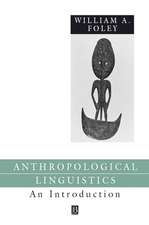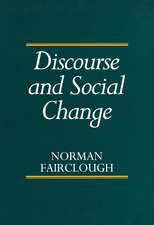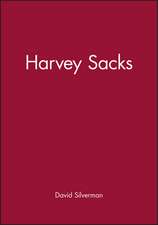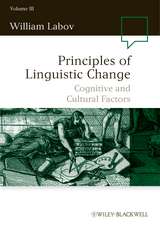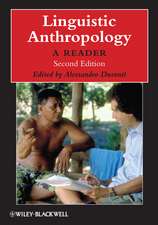Labov: A Guide for the Perplexed: Guides for the Perplexed
Autor Matthew J. Gordonen Limba Engleză Paperback – 7 noi 2012
| Toate formatele și edițiile | Preț | Express |
|---|---|---|
| Paperback (1) | 153.16 lei 6-8 săpt. | |
| Bloomsbury Publishing – 7 noi 2012 | 153.16 lei 6-8 săpt. | |
| Hardback (1) | 567.58 lei 6-8 săpt. | |
| Bloomsbury Publishing – 7 noi 2012 | 567.58 lei 6-8 săpt. |
Din seria Guides for the Perplexed
- 14%
 Preț: 164.68 lei
Preț: 164.68 lei - 14%
 Preț: 163.34 lei
Preț: 163.34 lei - 14%
 Preț: 179.10 lei
Preț: 179.10 lei -
 Preț: 145.10 lei
Preț: 145.10 lei - 14%
 Preț: 133.15 lei
Preț: 133.15 lei -
 Preț: 166.82 lei
Preț: 166.82 lei - 14%
 Preț: 170.50 lei
Preț: 170.50 lei - 24%
 Preț: 150.50 lei
Preț: 150.50 lei - 8%
 Preț: 145.90 lei
Preț: 145.90 lei -
 Preț: 178.12 lei
Preț: 178.12 lei - 15%
 Preț: 163.01 lei
Preț: 163.01 lei - 14%
 Preț: 165.03 lei
Preț: 165.03 lei - 8%
 Preț: 157.75 lei
Preț: 157.75 lei - 14%
 Preț: 164.93 lei
Preț: 164.93 lei - 14%
 Preț: 164.76 lei
Preț: 164.76 lei - 22%
 Preț: 164.31 lei
Preț: 164.31 lei - 9%
 Preț: 156.88 lei
Preț: 156.88 lei - 15%
 Preț: 162.99 lei
Preț: 162.99 lei - 22%
 Preț: 565.55 lei
Preț: 565.55 lei - 13%
 Preț: 256.49 lei
Preț: 256.49 lei - 14%
 Preț: 163.87 lei
Preț: 163.87 lei - 19%
 Preț: 158.90 lei
Preț: 158.90 lei - 19%
 Preț: 170.25 lei
Preț: 170.25 lei - 22%
 Preț: 595.65 lei
Preț: 595.65 lei -
 Preț: 215.33 lei
Preț: 215.33 lei - 22%
 Preț: 712.64 lei
Preț: 712.64 lei - 14%
 Preț: 164.13 lei
Preț: 164.13 lei - 14%
 Preț: 164.76 lei
Preț: 164.76 lei - 14%
 Preț: 145.10 lei
Preț: 145.10 lei - 14%
 Preț: 144.83 lei
Preț: 144.83 lei - 22%
 Preț: 595.32 lei
Preț: 595.32 lei - 20%
 Preț: 190.50 lei
Preț: 190.50 lei - 14%
 Preț: 176.25 lei
Preț: 176.25 lei - 14%
 Preț: 163.08 lei
Preț: 163.08 lei - 22%
 Preț: 567.17 lei
Preț: 567.17 lei - 20%
 Preț: 177.77 lei
Preț: 177.77 lei - 22%
 Preț: 770.86 lei
Preț: 770.86 lei - 14%
 Preț: 163.96 lei
Preț: 163.96 lei - 22%
 Preț: 946.89 lei
Preț: 946.89 lei - 14%
 Preț: 145.01 lei
Preț: 145.01 lei - 20%
 Preț: 176.25 lei
Preț: 176.25 lei - 14%
 Preț: 595.17 lei
Preț: 595.17 lei
Preț: 153.16 lei
Preț vechi: 166.29 lei
-8% Nou
Puncte Express: 230
Preț estimativ în valută:
29.31€ • 30.41$ • 24.50£
29.31€ • 30.41$ • 24.50£
Carte tipărită la comandă
Livrare economică 17-31 martie
Preluare comenzi: 021 569.72.76
Specificații
ISBN-13: 9781441158529
ISBN-10: 1441158529
Pagini: 240
Ilustrații: illustrations
Dimensiuni: 138 x 216 x 15 mm
Greutate: 0.34 kg
Ediția:New.
Editura: Bloomsbury Publishing
Colecția Bloomsbury Academic
Seria Guides for the Perplexed
Locul publicării:London, United Kingdom
ISBN-10: 1441158529
Pagini: 240
Ilustrații: illustrations
Dimensiuni: 138 x 216 x 15 mm
Greutate: 0.34 kg
Ediția:New.
Editura: Bloomsbury Publishing
Colecția Bloomsbury Academic
Seria Guides for the Perplexed
Locul publicării:London, United Kingdom
Caracteristici
Labov's work is written for sociolinguists. This brings his findings to a wider audience.
Notă biografică
Matthew J. Gordon is Associate Professor in the English Department at the University of Missouri, USA
Cuprins
Acknowledgements \ List of Figures \ 1. The Challenges of Labov \ 2. Linguistics and Sociolinguistics before Labov \ 3. How to Establish a Field as a Graduate Student \ 4. A Variationist Approach to Language \ 5. Speech Styles and Discourse \ 6. The "Socio" of Sociolinguistics \ 7. Labov as Historical Linguist \ 8. African American English: Lessons Learned, Lessons Taught \ 9. The Revolution at 50 \ Bibliography \ Index
Recenzii
Labov makes an apt subject for a volume in Continuum's series Guides for the Perplexed, which seeks to provide concise, undergraduate-level introductions to writers and subjects often perceived to be dauntingly complex. Matthew Gordon's book fulfils the remit admirably, offering an instructive and accessible companion to Labov's work and the variationist approach to language description and change... this guide is a clear success: in keeping a narrow focus on Labov's own research (from his renowned Martha's Vineyard and New York City studies to his engagement with African American Vernacular English and the mapping of current North American dialects), Gordon manages to tell the "life story" of sociolinguistics in a compact and coherent manner.
A treasure trove ... Students will love this as an easy-reading introduction that nevertheless points out potential problems clearly, but even seasoned colleagues will find details they were perhaps not aware of before, or make new connections that were obscure before: a clear recommendation.
Yes, William Labov really did establish a whole new academic field when he was a graduate student. And he has remained at the forefront of that field to this day. Matthew Gordon describes how, why, when and where this happened, and explains with great clarity the importance and excitement of it all. It's a remarkable story, and Gordon has really done it justice.
Gordon has written a mesmerizing narrative of one of the greatest linguists in the history of the profession, capturing the historical, social, and theoretical significance of Labov's pioneering studies of language in its social context. It is an invaluable, timeless contribution to understanding the modern development of our discipline.
For linguists and science historians, Gordon paints a contextually rich picture of William Labov's scholarship. Gordon provides extensive explanation of Labov's many milestones from the 1960s to 2010 and also contextualizes the development of linguistic and sociolinguistic fields over this time. This book would be helpful for any student of sociolinguistics.
Gordon's book is an amazingly comprehensive yet brilliantly clear presentation of the frameworks and contributions of William Labov, the founding figure in modern sociolinguistics and indeed one of the defining figures in linguistics more generally. With his characteristic lucidity, wit and personal touch, Gordon offers a presentation of the origin, growth and continuing development of Labov's thoughts and works, and Labovian sociolinguistics, that will prove to be indispensable reading for introductory students as well as an invaluable and engaging reference for even the most established scholars in the field. If a sociolinguistic were stranded on a desert island (or an island like Martha's Vineyard), and could choose one book for company, this essential distillation of the "Best of Labov" would truly be it.
Noteworthy features of this book, which will be extremely helpful for readers who may not be familiar with the field of linguistics, are the discussions of basic concepts in linguistics and how these concepts relate to Labov's work. Gordon provides detailed yet concise explanations of the technical vocabulary, figures and tables, and studies he references, making excellent use of footnotes in each chapter to provide clarification and recommendations on where the reader can turn for a more thorough discussion of certain topics... This book is a valuable resource for anyone who has ever felt perplexed by the breadth of Labov's work and the impact of his research on academics and society at large. It provides nonspecialists, beginning researchers, and veterans in the field of linguistics with a new perspective on the methods and approaches of William Labov.
A clear, comprehensive, and remarkable presentation of the life and contributions of William Labov, the celebrated linguist considered by many to be the founder of modern sociolinguistics. In this book, Matthew Gordon masterfully weaves the narrative of Labov's life and work together with an overview of sociolinguistics and of sociolinguistic concepts, providing context to Labov's research and the innovative changes he made to the way we study language. This book is an intellectually stimulating read for individuals at any level of interest in sociolinguistics, or linguistics more generally. Readers will find this book a witty, engaging, and illuminating description of Labov's work and contributions to sociolinguistics.
William Labov (b. 1927) revolutionized the field of sociolinguistics with his rigorous quantitative approach and, maybe more importantly, with the questions he asked. In a series of landmark studies, he showed that it was possible to investigate language variation in an empirical manner as well as to observe language change in action. In this highly readable book, Gordon (English, Univ. of Missouri) provides an excellent introduction to Labov's work and, to a great extent, the field of sociolinguistics. The narrative is clear and, in places, almost entertaining (for an academic book). The author does a very good job of helping readers understand the importance of Labov's work for linguistics and also for cultural studies generally. Labov's work needs to be better known, and it remains extremely relevant. For instance, his investigations of African American vernacular English provide much-needed context for understanding the testimony of witness Rachel Jeantel during George Zimmerman's 2013 trial for the murder of Trayvon Martin.
A treasure trove ... Students will love this as an easy-reading introduction that nevertheless points out potential problems clearly, but even seasoned colleagues will find details they were perhaps not aware of before, or make new connections that were obscure before: a clear recommendation.
Yes, William Labov really did establish a whole new academic field when he was a graduate student. And he has remained at the forefront of that field to this day. Matthew Gordon describes how, why, when and where this happened, and explains with great clarity the importance and excitement of it all. It's a remarkable story, and Gordon has really done it justice.
Gordon has written a mesmerizing narrative of one of the greatest linguists in the history of the profession, capturing the historical, social, and theoretical significance of Labov's pioneering studies of language in its social context. It is an invaluable, timeless contribution to understanding the modern development of our discipline.
For linguists and science historians, Gordon paints a contextually rich picture of William Labov's scholarship. Gordon provides extensive explanation of Labov's many milestones from the 1960s to 2010 and also contextualizes the development of linguistic and sociolinguistic fields over this time. This book would be helpful for any student of sociolinguistics.
Gordon's book is an amazingly comprehensive yet brilliantly clear presentation of the frameworks and contributions of William Labov, the founding figure in modern sociolinguistics and indeed one of the defining figures in linguistics more generally. With his characteristic lucidity, wit and personal touch, Gordon offers a presentation of the origin, growth and continuing development of Labov's thoughts and works, and Labovian sociolinguistics, that will prove to be indispensable reading for introductory students as well as an invaluable and engaging reference for even the most established scholars in the field. If a sociolinguistic were stranded on a desert island (or an island like Martha's Vineyard), and could choose one book for company, this essential distillation of the "Best of Labov" would truly be it.
Noteworthy features of this book, which will be extremely helpful for readers who may not be familiar with the field of linguistics, are the discussions of basic concepts in linguistics and how these concepts relate to Labov's work. Gordon provides detailed yet concise explanations of the technical vocabulary, figures and tables, and studies he references, making excellent use of footnotes in each chapter to provide clarification and recommendations on where the reader can turn for a more thorough discussion of certain topics... This book is a valuable resource for anyone who has ever felt perplexed by the breadth of Labov's work and the impact of his research on academics and society at large. It provides nonspecialists, beginning researchers, and veterans in the field of linguistics with a new perspective on the methods and approaches of William Labov.
A clear, comprehensive, and remarkable presentation of the life and contributions of William Labov, the celebrated linguist considered by many to be the founder of modern sociolinguistics. In this book, Matthew Gordon masterfully weaves the narrative of Labov's life and work together with an overview of sociolinguistics and of sociolinguistic concepts, providing context to Labov's research and the innovative changes he made to the way we study language. This book is an intellectually stimulating read for individuals at any level of interest in sociolinguistics, or linguistics more generally. Readers will find this book a witty, engaging, and illuminating description of Labov's work and contributions to sociolinguistics.
William Labov (b. 1927) revolutionized the field of sociolinguistics with his rigorous quantitative approach and, maybe more importantly, with the questions he asked. In a series of landmark studies, he showed that it was possible to investigate language variation in an empirical manner as well as to observe language change in action. In this highly readable book, Gordon (English, Univ. of Missouri) provides an excellent introduction to Labov's work and, to a great extent, the field of sociolinguistics. The narrative is clear and, in places, almost entertaining (for an academic book). The author does a very good job of helping readers understand the importance of Labov's work for linguistics and also for cultural studies generally. Labov's work needs to be better known, and it remains extremely relevant. For instance, his investigations of African American vernacular English provide much-needed context for understanding the testimony of witness Rachel Jeantel during George Zimmerman's 2013 trial for the murder of Trayvon Martin.


